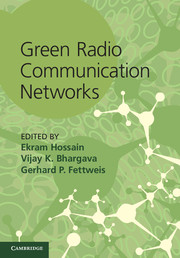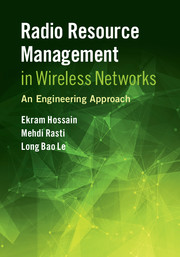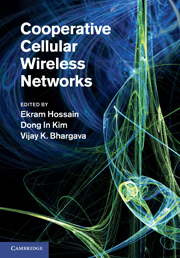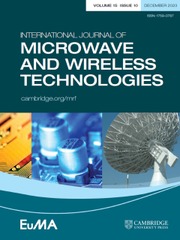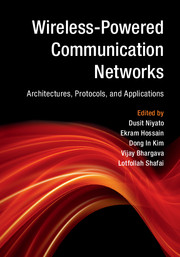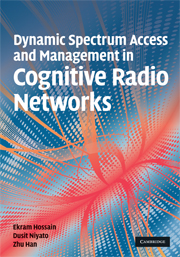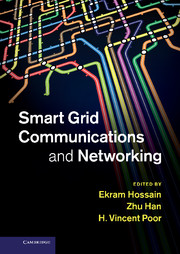Green Radio Communication Networks
The importance of reducing energy costs, reducing CO2 emissions and protecting the environment are leading to an increased focus on green, energy-efficient approaches to the design of next-generation wireless networks. Presenting state-of-the-art research on green radio communications and networking technology by leaders in the field, this book is invaluable for researchers and professionals working in wireless communication. Summarizing existing and ongoing research, the book explores communication architectures and models, physical communications techniques, base station power-management techniques, wireless access techniques for green radio networks, and green radio test-bed, experimental results and standardization activities. Throughout, theoretical results are blended with practical insights and coverage of deployment issues. It serves as a one-stop reference for key concepts and design techniques for energy-efficient communications and networking and provides information essential for the design of future-generation cellular wireless systems.
- The first reference on advanced data communications and networking techniques for green radio systems
- Provides a comprehensive treatment of the state-of-the-art of existing and ongoing research
- Summarizes current theory, key strategies and protocols, deployment aspects, ongoing standardization and experimental activities on green wireless communications technologies
Reviews & endorsements
'This book is an excellent summary of existing literature on green communications from a communications theorist point of view. It can be extremely valuable to researchers in this emerging area.' Vahid Tarokh, Harvard University
'… an excellent snapshot of the state of green in wireless networking and … a nice overview of who is doing what and where in the field.' Alfy Riddle, IEEE Microwave Magazine
'This is one of the first books related to the area of green wireless communication. It provides a good overview of different research works carried out independently by various groups.' Michal Wagrowski, IEEE Communications Magazine
'This book contains contributions from almost 60 scientists and engineers in academia and industry. Green Radio Communication Networks is an excellent snapshot of the state of green in wireless networking, and it is a nice overview of who is doing what and where in the field.' Microwave Magazine
Product details
July 2012Hardback
9781107017542
440 pages
249 × 178 × 25 mm
1kg
171 b/w illus. 22 tables
Available
Table of Contents
- Part I. Communication Architectures and Models for Green Radio Networks:
- 1. Fundamental trade-offs on the design of green radio networks Yan Chen, Shunqing Zhang and Shugong Xu
- 2. Algorithms for energy-harvesting wireless networks Vinod Sharma, Utpal Mukherji and Vinay Joseph
- 3. PHY and MAC layer optimization for energy-harvesting wireless networks Neelesh B. Mehta and Chandra R. Murthy
- 4. Mechanical relaying techniques in cellular wireless networks Panayiotis Kolios, Vasilis Friderikos and Katerina Papadaki
- Part II. Physical Communications Techniques for Green Radio Networks:
- 5. Green modulation and coding schemes in energy-constrained wireless networks Jamshid Abouei, Konstantinos N. Plataniotis and Subbarayan Pasupathy
- 6. Cooperative techniques for energy-efficient wireless communications Osama Amin, Sara Bavarian and Lutz Lampe
- 7. Effect of cooperation and network coding on energy-efficiency of wireless transmissions Nof Abuzainab and Anthony Ephremides
- Part III. Base Station Power-Management Techniques for Green Radio Networks:
- 8. Opportunistic spectrum and load management for green radio networks Oliver Holland, Christian Facchini, A. Hamid Aghvami, Orlando Cabral and Fernando Velez
- 9. Energy-saving techniques in cellular wireless base stations Tao Chen, Honggang Zhang, Yang Yang and Kari Horneman
- 10. Power-management for base stations in smart grid environment Xiao Lu, Dusit Niyato and Ping Wang
- 11. Cooperative multicell processing techniques for energy-efficient cellular wireless communications Mohammad Reza Nakhai, Tuan Anh Le, Auon Muhammad Akhtar and Oliver Holland
- Part IV. Wireless Access Techniques for Green Radio Networks:
- 12. Cross-layer design of adaptive packet scheduling for green radio networks Ashok Karmokar, Alagan Anpalagan and Ekram Hossain
- 13. Energy-efficient relaying for cooperative cellular wireless networks Yifei Wei, Mei Song and F. Richard Yu
- 14. Energy performance in TDD-CDMA multihop cellular networks Hoang Thanh Long, Xue Jun Li and Peter Han Joo Chong
- 15. Resource allocation for green communication in relay-based cellular networks Umesh Phuyal, Satish C. Jha and Vijay K. Bhargava
- Part V. Green Radio Test-Bed, Experimental Results, and Standardization Activities:
- 16. How much energy is needed to run a wireless network? Gunther Auer, Vito Giannini, Istv́an Godor, Oliver Blume, Albrecht Fehske, Jose Alonso Rubio, Pål Frenger, Magnus Olsson, Dario Sabella, Manuel J. Gonzalez, Muhammad Ali Imran and Claude Desset
- 17. Standardization, fora, and joint industrial projects on green radio networks Alberto Conte, Hakon Helmers and Philippe Sehier.

